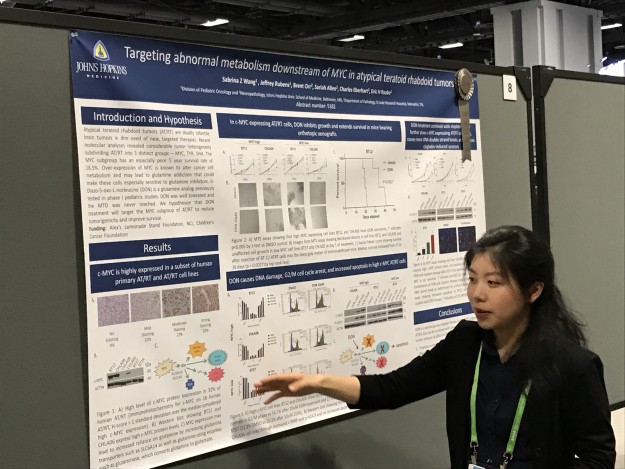Johns Hopkins undergraduate student Sabrina Wang won first place in a competition among 125 students for her research on a lethal type of pediatric brain tumor called atypical teratoid/rhabdoid tumors (AT/RT), the most common brain tumor type in infants. The award was presented at the AACR 2017 annual meeting in Washington, D.C., on April 2. Wang found that a subset of AT/RT tumors expresses a gene called MYC. Research by Johns Hopkins Kimmel Cancer Center experts has shown that cancers cells expressing this gene can alter the way they process nutrients as an energy source. In cell culture studies, Wang used so-called glutamine-inhibiting drugs to block the metabolism processes of AT/RT cells. In mice, glutamine-inhibiting drugs doubled the survival of mice implanted with AT/RT brain tumors that express MYC compared to mice with similar tumors treated with a saline control. Wang works in the laboratory of Kimmel Cancer Center pediatric oncologist Eric Raabe.
"This exciting research opens a new avenue for AT/RT treatment," says Raabe. "Glutamine metabolic inhibitors have a good safety profile in children in phase 1 studies, and we believe they may add a new, less toxic modality to AT/RT therapy. Sabrina and her lab supervisor Dr. Jeffrey Rubens have worked with dedication to bring this research to this point. I applaud Sabrina for this well-deserved recognition."
Raabe also said that this award and the scientific research that underpins it confirms undergraduate students' valuable contributions to cancer research. "Undergraduates can bring a tremendous amount of energy and enthusiasm to the lab, and Sabrina is a prime example of this," Raabe says. "She is exemplary of undergraduate students who have made major contributions to our scientific efforts."
Alex's Lemonade Stand funded the research through its Pediatric Oncology Student Training program. "This program is essential for allowing us to capture the interest of talented undergraduates like Sabrina," says Raabe.
